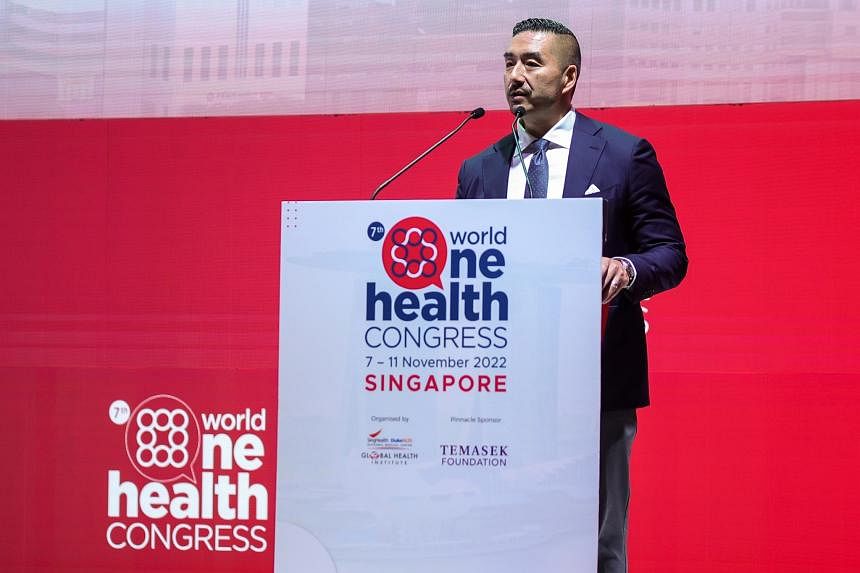SINGAPORE - Artificial intelligence has been touted, along with other strategies, to be the future of pandemic prevention and response at the 7th World One Health Congress in Singapore.
Speaking at the congress, Professor Dean Ho, head of the Department of Biomedical Engineering at the National University of Singapore (NUS), presented his interactive digital platform, IDentif.AI, showing how it was poised to combat the next potential pandemic.
Prof Ho, who is also director of the Institute for Digital Medicine at the NUS Yong Loo Lin School of Medicine, and his team of researchers developed IDentif.AI in 2020.
Leveraging AI, IDentif.AI can collect and analyse patient data to determine the most effective combinations of various drugs and their dosage to combat diseases such as Covid-19.
In May 2022, the team used IDentif.AI to successfully produce a drug regimen consisting of antiviral drugs and a protease-inhibiting drug (usually used to treat HIV), which was found to be effective in lab settings against the Covid-19 Omicron variant.
The congress, which was organised by the SingHealth Duke-NUS Global Health Institute, took place at the Sands Expo and Convention Centre from Monday to Friday. It brought together leading health experts from around the globe to share their insights about various fields in health.
Prof Ho urged the medical community to collaborate in predicting pathogens that could cause the next pandemic, and allow IDentif.AI to run experiments on them using combinations of currently available drug therapies.
He and his team plan to continue using IDentif.AI to experiment with drug regimens not just on future Covid-19 strains but also on antimicrobial resistance (AMR).
Antimicrobial resistance occurs when pathogens change over time and no longer respond to medicine, making infections harder to treat, and increasing the risk of disease spread, severe illness and death.
“We’re already doing AMR internationally and domestically with various stakeholders, especially epidemiologists around the world, because we want to better understand what their eyes are on,” Prof Ho told The Straits Times on Thursday.
“We would love to start thinking ahead about which pathogens we should pay attention to,” he added.
Apart from AI, the congress on Thursday also discussed other strategies to combat future pandemics.
The day opened with a keynote speech by Dr Manuela Ferro, regional vice-president for East Asia and the Pacific at the World Bank, where she highlighted the importance of the One Health approach of investing in preparedness, instead of only response, in combatting future pandemics.
Agreeing with her, Dr Martien van Nieuwkoop, global director for food and agriculture at the World Bank who chaired the session, called for countries to adopt a multisectoral approach requiring the various ministries of a country to collaborate towards a pandemic response.
“If you ask the minister of agriculture what his or her contribution is to One Health, he or she wouldn’t know. What is needed is a systematic approach that enables a One Health lens on the budget... facilitating better coordination across the ministries,” he told ST.
Dr Christopher Elias, president of the Global Development Division of the Bill and Melinda Gates Foundation, called for philanthropic organisations to boost pandemic preparedness by placing “bets in areas where governments and businesses traditionally would not”, create partnerships with organisations, and invest in the research of new, emerging technologies.
Emphasising surveillance as the key to pandemic prevention, Sir Jeremy Farrar, director of charity organisation Wellcome Trust, highlighted the growing threat of AMR and its relevance to future pandemics.
“If we put surveillance on antimicrobial resistance at the core of our long-term commitment to surveillance, to improve both therapies and treatments, then I think we would be much better prepared to be able to pivot to emerging infections and diseases when they occur,” he said.

